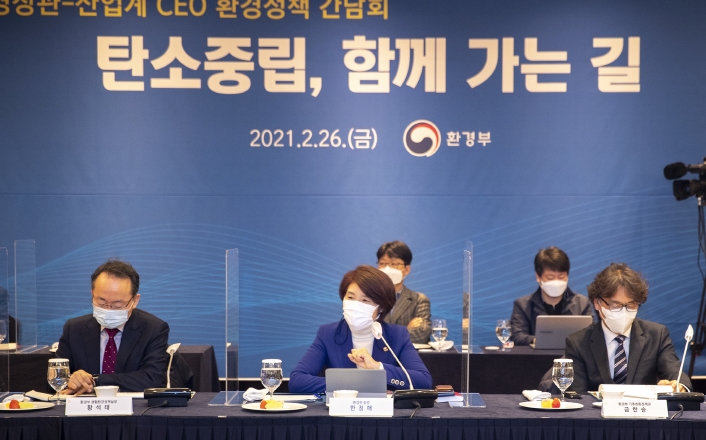The Ministry of Environment (Minister Han Han-ae) announced that it held a meeting with the industry on the morning of February 26 at the Grand Intercontinental Hotel in Gangnam-gu, Seoul.
The meeting was attended by representatives of major companies participating in the greenhouse gas emission trading system, including Environment Minister Hanjeong-ae, Samsung Electronics President Choi Si-young, Kim Hak-dong, POSCO steel division president, Kim Gyo-hyun, CEO of Lotte Chemical, and Gong Young-woon, president of Hyundai Motor Company.
Minister Han Jeong-ae and corporate representatives shared the direction of carbon neutrality between the government and companies, and discussed the necessary support, system improvement, and difficulties in the process of promoting carbon neutrality.
Minister Han Jeong-ae said in a greeting prior to the start of the conference, “Recently, disasters caused by climate change such as cold waves, forest fires, and floods have occurred around the world, and the’climate crisis’ is becoming a reality.” He emphasized that the response to climate change is the path we must go because the environment and industry such as corporate governance (ESG) management are linked and the response to climate change is delayed.
 |
||
| ▲ On February 26, while a meeting with the industry and environmental policy was held at the Grand Intercontinental Hotel in Gangnam-gu, Seoul, Minister of Environment Hanjeong-ae is speaking. | ||
After the start of the meeting, Han-Seung Geum, Minister of Environment’s Climate Change Policy Officer, introduced the contents and schedule of discussions within the government for carbon neutrality under the theme of’Establishment of Carbon Neutral Scenario and Implementation Strategy.
In the first half of this year, the Ministry of Environment plans to prepare a carbon-neutral scenario through gathering industry opinions and a national conference, and reflect it in various national plans, such as raising the 2030 National Greenhouse Gas Reduction Target.
Subsequently, POSCO, Korea Cement Association, Korea District Heating Corporation, and Lotte Chemical announced carbon-neutral initiatives promoted by companies and industries.
POSCO announced its ambition to achieve carbon neutrality in 2050 by reducing the current amount of greenhouse gas emissions by about 79 million tons by improving energy efficiency and introducing hydrogen reduction steel.
The Korea Cement Association established its own Carbon Neutral Committee and announced plans to replace coal currently used as fuel with biomass waste and expand waste heat generation.
The Korea District Heating Corporation will invest 16.3 trillion won by 2050 to produce clean oil from waste plastics, etc., and focus on the waste to hydrogenation project (W2H, Waste to Hydrogen), which extracts and utilizes hydrogen from clean oil.
Lotte Chemical plans to improve the existing process of supplying plastic raw materials by decomposing naphtha (naphtha), replacing naphtha produced from crude oil with low-carbon raw materials, and gasifying waste plastic to reuse.
Corporate representatives requested substantial support from the government, such as R&D support and investment tax credits to preemptively introduce reduction technologies.
In particular, they suggested that large corporations need strict tax credits or easing the level of technology development contributions because they are applied differentially by company size.
POSCO is expected to require most of the amount of green hydrogen production and renewable energy currently planned by the government to achieve its goal, and requested the government to establish an infrastructure (infrastructure) for the stable supply of green hydrogen and renewable energy power. did.
In addition, Hanwha Energy suggested that it is necessary to consider the benefits of distributed power when a collective energy provider that supplies heat to industrial processes converts to eco-friendly energy.
Korean Air has ordered a support system for revitalizing the production and distribution of bio-aircraft fuel.
Since Minister Han Jeong-ae is planning to promote technology development projects related to circular economy, the Ministry of Environment has formed a’Circular Economy Research and Development (R&D) Planning Council’ to discover necessary tasks and reflect them in the government-wide investment direction and step-by-step implementation plan (roadmap). Suggested.
In addition, tax deductions for large corporations in investment in GHG reduction technology, reduction of the level of contributions for technology development, and activation of bio-engineering fuels, etc., were decided to be reviewed with relevant ministries after a government-wide discussion.
Participants of the conference on this day had an active discussion on carbon neutrality, which served as an opportunity to further close the relationship between the Ministry of Environment and the industry.
Minister Han Jeong-ae said, “The 2050 carbon neutrality is a task that can be achieved only when we all work together.” said.
